
THE VOICE OF INTERNATIONAL LITHUANIA
|
VilNews has its own Google archive! Type a word in the above search box to find any article.
You can also follow us on Facebook. We have two different pages. Click to open and join.
|
Archive for June, 2011
Human trafficking and exploitation
- Posted by - (1) Comment
![]()

Associate Professor Aurelijus Gutauskas, Mykolas Romeris University, Law Faculty,. Criminal Law and Criminology Department
Head of the Department
By Aurelijus Gutauskas
Human trafficking has taken a new form as some victims agree to travel to countries with higher standards of living and engage in voluntary prostitution. The women's social vulnerability (unemployment, absence of income) and absence of other information results in their allowing others to take half of their income. Human trafficking is organized and committed not only by Organized Criminal Groups (OCGs) but also, in some regions of Lithuania, by individuals with no direct connections with OCGs.
Human trafficking involves recruiting people (by deception or telling the truth), organizing transportation (by finding ways to forge documents and arrange transport), and searching for locations in which to sell and receive profit. Payment is sometimes extracted from the person's earnings.
Victims of human trafficking are usually women aged 18 to 24. They are recruited through modeling agencies, radio shows, online dating, social networks such as Facebook and other websites, and often voluntarily leave their home countries.
Cases are known in which women are offered legal jobs (as waitresses and dancers), but once transported abroad they are forced to provide sexual services. Violence is also often used to make them work and to intimidate others. Search and recruitment is conducted by low-level members of the OCGs. Women are not only recruited by procurers but also by working prostitutes who receive rewards of up to 600 euros for a new woman.
Poland is one of the main transit countries through which persons are carried, but persons were also carried through Latvia, Germany, and the Czech Republic (using land transport where there was no internal border control). The destination countries are states with higher standards of living, whose economies are more stable, and where there is a demand for cheap labor and sexual services (e.g., Germany).
Employment, dating, and modeling agencies, recreation centers, nightclubs, rented flats, and hotels are used to commit these criminal acts. The establishment of LBSs is often planned along with the criminal activity being organized. Companies are set up in the names of other, often antisocial, persons. LBSs are established not only in Lithuania but also in the countries in which criminal acts are committed.
Favorable conditions for these criminal acts are created by tolerant national legislation, scarce state control, and the demand for sexual services and cheap labor in the destination countries.
The commission of these criminal activities is conditioned by complicated economic situations and high levels of unemployment in Lithuania. The reason OCGs participate in these criminal acts may be that they offer low risk and high profits. The proceeds of this crime are invested in legal business, and so destabilize the economy of the state.
- Bookmark :
- Digg
- del.icio.us
- Stumbleupon
- Redit it
- Posted by - (0) Comment

Midsummer Afro-Latin Dance Festival!
The annual Afro Latin dance festival in Lithuania (the 3rd International Bachata Festival) takes place in Crown Plaza Hotel in Vilnius this midsummer weekend, uniting dancers from every Continent of the World!
The event is annually organized by Afro-Latin dance studio „Bachata Souls“, located in Vilnius, Lithuania and has already gained a permanent audience.
Luxuriant program, top level international dance instructors and performers, fluent organization has led festival to acknowledgement on the international scale.
During 3 days there are 20 Afro-Latin dance lessons of different levels led by international and local instructors.
During the evenings guests are enjoying shows by Masters and Amateurs, participating in fancy contests and spontaneous improvisations and social dancing. Beginners will also find their space to get real practice on the dance floor with upper level dancers, intermediate and advanced dancers who usually are chasing their favourite dance instructors all over the world to have some dances with him or her, also meeting their friends – dancers from other countries.
Here is what the organizers tell about the Festival:
„During the days of the event we become one huge family. We live, eat, learn, socialize and dance at the same place, and in the end we don’t want to say „good bye“. We do not want to leave each other any more...
And we are not. We meet in Vilnius, Lithuania once per year in the most beautiful time of the year – Midsummer. We long for those days all year long.
We find big Hearts and Souls teaching and big Hearts and Souls learning here.
It is our Celebration of Love, Peace and Beauty expressed by Dance. We truly wish you have a chance to come and experience it...” – say everyone who had a chance to get together during those days of Lithuanian summer. And this is true.
And here about the programme:
• Almost 40 workshops of over 20 Afro-Latin dances!
• BEST prices for Beginner’s Passes!
• Crazy, hot and adventurous Lap Dancing lessons!
• Show animations – lessons with famous Dance Masters in the World!
• Hot and fancy body styling workshops!
• Question and Answer Session/ Dance History lesson with panel of teachers and organizers;
• Amateur and Masters’ Jack and Jill, improvisations’ contests;
• Featuring Top DANCERS & DJs from Costa Rica, Brazil, Mexico, Cape Verde, Australia, India, USA, Spain, Italy, Portugal, Finland and Lithuania in the biggest smallest country of Lithuania;
• MAGNIFICENT PERFORMANCES, HOT NIGHT DANCE PARTIES, FANCY CONTESTS AND GREAT PRIZES!
• Special package for 1 week vacation „UNSEEN LITHUANIA“.
WANT TO JOIN? CONTACT: Giedrė Ieva Kondratė at tel. 8 603 57776 or at GS@bachatasouls.lt
Read more at: www.bachata.lt
- Bookmark :
- Digg
- del.icio.us
- Stumbleupon
- Redit it
- Posted by - (0) Comment
Washington Post:
Baltic countries hold a lesson for Greece in crisis

As Greece’s anguish spills into the streets, three small Baltic countries may offer an example, if not a model, of how to survive an economic crisis through austerity measures.
After suffering the deepest recession in Europe during the global financial crisis, Latvia, Lithuania and Estonia swallowed the bitter medicine that Greece is now being asked to take.
Painful cure
They slashed pensions, welfare benefits and public sector salaries while raising taxes. Latvia, which came dangerously close to bankruptcy, had to fire thousands of public servants and close schools and hospitals.
It was painful, but the cure worked. Battered and bruised, the three former Soviet republics are now on a path to recovery. Latvia’s budget-cutting government even won re-election last year.
“Latvia has a lot of lessons for Greece, but they are all coming too late,” said Morten Hansen, head of the economics department at the Stockholm School of Economics in Riga.
The main lesson: Push through austerity measures quickly before public support ebbs out.

Morten Hansen, head of the economics department at the Stockholm School of Economics in Riga.
“You can have that support for some time, but not three-four years,” he said. “Now people are starting to get more unhappy (in Latvia), but now the worst is over.”
Protests in Greece, where anti-government demonstrations are more common than in Northern European countries, have taken on new momentum. There is a constant sit-in in the central square in Athens and violent clashes with police have become a regular occurrence.
In the Baltic countries, which for decades suffered under a brutal Soviet occupation, the fiery Greek protests have been met with some bemusement. Besides a couple of clashes in Riga and the Lithuanian capital, Vilnius, in 2009, the Baltic countries didn’t see any street violence.
Cultural differences
“For me it comes down to some cultural differences — we just understand the world differently. We accept the cuts, are not happy with them, especially those who suffer from it directly, but we understand why we have to do that,” said Marge Tubalkain-Trell from Estonia, who lost her job and had trouble getting the medical care she needed because of crisis-related social cuts.
Deimante Doksaite from Lithuania, which narrowly avoided having to take its own bailout during the crisis, agreed.
Greeks are spoiled
“Greeks are spoiled. Being quiet helped us to deal with the crisis,” said Doksaite, who lost her job as a media relations officer when the crisis struck.
Greece has already implemented austerity measures to meet the conditions of a €110 billion ($158 billion) bailout from Europe and the International Monetary Fund. But it has struggled to meet many of its targets, and is now in negotiations for a second bailout. The government faces a crucial vote next week for a new round of austerity measures.
The parallels with Latvia are striking.
In 2009 Latvia was nearing default, with over 300 percent more maturing foreign debt than reserves. Many speculated it would have to abandon its currency peg to the euro.
Latvia was the hardest hit country in the world
According to the IMF, Latvia was the hardest hit country in the world by the economic crisis, with an overall decline in gross domestic product of around 25 percent. Unemployment reached nearly 23 percent while foreign investment dropped to almost zero.
- Bookmark :
- Digg
- del.icio.us
- Stumbleupon
- Redit it
Euro is “not something to kill yourself over”
- Posted by - (0) Comment
![]()

Vitas Vasiliauskas, Chairman of the Bank of Lithuania
Adopting the euro is "not something to kill yourself over," says Lithuania's central bank governor. It's a common sentiment in the region.
First join the European Union, then qualify for the euro. That was the path laid out for the countries of Eastern Europe that wanted to weld themselves to the West. Euro membership proved that a country had the discipline to join one of the world's most exclusive clubs.
The Greek crisis has slowed the rush to join. On June 7, Latvia's central bank governor, Ilmars Rimsevics, said the euro shouldn't be introduced in his country "at any price." His Lithuanian counterpart, Vitas Vasiliauskas, said two days later that the goal of adopting the euro in three years is "not something to kill yourself over."
Read more at:
http://www.businessweek.com/magazine/content/11_27/b4235017725502.htm
- Bookmark :
- Digg
- del.icio.us
- Stumbleupon
- Redit it
Lithuanian Parliament approves 120 million compensation for alienated Jewish property
- Posted by - (0) Comment
![]()
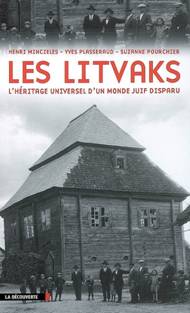
Lithuania's parliament (Seimas) on Tuesday approved the decision to pay 128 million litas (over 37 million euros) in the next 10 years to compensate Jewish people for their property alienated by totalitarian regimes.
82 MPs voted for the adoption of bill on Good Will Compensation for Real Estate of Jewish Religious Communities, 7 were against and 16 members of the Lithuanian parliament abstained.
The compensation will be paid in 2013-2023 and used for religious, cultural, health, sports, educational and scientific goals of Lithuanians Jews in Lithuania. A one-off sum of 3 million litas will have to be used to support people of Jewish nationality who lived in Lithuania and suffered from totalitarian regimes during the period of occupation.
Under the adopted bill, the compensation will be transferred to a special fund the governing body of which would represent the Jewish Community in Lithuania, the Religious Jewish Community of Lithuania and other Jewish religious, health, cultural and education organizations.
- Bookmark :
- Digg
- del.icio.us
- Stumbleupon
- Redit it
![]()
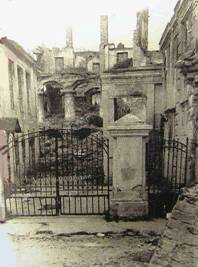
The Great Synagogue in Vilnius was partly destroyed by the Germans during World War II. The ruined synagogue and the whole “schulhof” complex which had grown around it were demolished by the Soviet authorities from 1955 to 1957 and were intentionally replaced by a basketball court and a kindergarten to effectively prevent any future initiatives to rebuild a cultural monument.
- Bookmark :
- Digg
- del.icio.us
- Stumbleupon
- Redit it
Lithuanian Parliament approves 120 million compensation for alienated Jewish property
- Posted by - (1) Comment
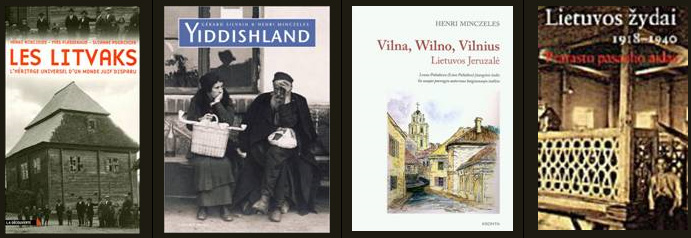
Lithuania's parliament (Seimas) on Tuesday approved the decision to pay 128 million litas (over 37 million euros) in the next 10 years to compensate Jewish people for their property alienated by totalitarian regimes.
82 MPs voted for the adoption of bill on Good Will Compensation for Real Estate of Jewish Religious Communities, 7 were against and 16 members of the Lithuanian parliament abstained.
The compensation will be paid in 2013-2023 and used for religious, cultural, health, sports, educational and scientific goals of Lithuanians Jews in Lithuania. A one-off sum of 3 million litas will have to be used to support people of Jewish nationality who lived in Lithuania and suffered from totalitarian regimes during the period of occupation.
Under the adopted bill, the compensation will be transferred to a special fund the governing body of which would represent the Jewish Community in Lithuania, the Religious Jewish Community of Lithuania and other Jewish religious, health, cultural and education organizations.
The bill, drawn up by the Ministry of Justice, was substantially amended during its consideration by parliamentary committees. A provision was included stating that the sum of compensation is final and no claims can be made in the future and the sum of compensation changed.
Parliamentary committees also decided that the government should audit the way the compensation is used. The initial version of the bill did not foresee financial accountability.
If an audit showed the fund misused the money, the government would have the right to suspend paying the compensation and decide on another fund.
The compensation makes around 30 percent of the value of Jewish property nationalized or alienated in any other way by Nazi and Soviet totalitarian regimes.
Authors of the bill believe the adopted law will demonstrate good will to restore historic justice, improve Lithuanian-Jewish relations as well as to show respect for human rights and commitments to global Jewish community and international organizations. Moreover, it is hoped that the transfer of property would provide Lithuania with politically stronger positions in its talks with Russia on compensation of damage caused by the totalitarian regime.
- Bookmark :
- Digg
- del.icio.us
- Stumbleupon
- Redit it
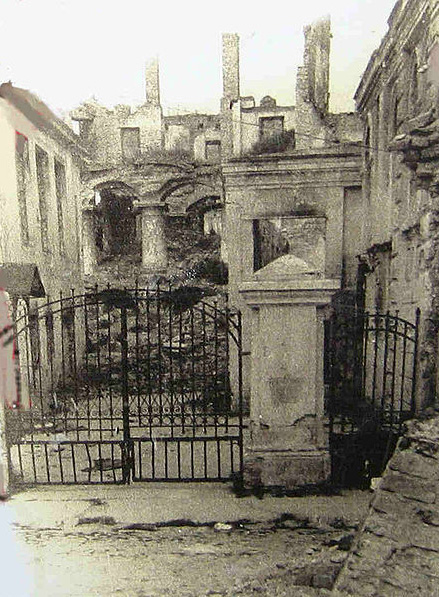
The Great Synagogue in Vilnius was partly destroyed by the Germans during World War II. The ruined synagogue and the whole “schulhof” complex which had grown around it were demolished by the Soviet authorities from 1955 to 1957 and were intentionally replaced by a basketball court and a kindergarten to effectively prevent any future initiatives to rebuild a cultural monument.
With a view to perpetuating the memory of the former Jewish spiritual and cultural center – the Great Synagogue of Vilnius – a historical archaeological excavation of the site has been launched. The exploration team led by archaeologist Zenonas Baubonis is ready to embark on the exploration of the site of the former Jewish house of worship at Vokiečių Street 13A. This work is expected to be completed by September so that the elementary school of Vytė Nemunėlis, which happens to be in territory of the former Synagogue, could start on time.
"The Great Synagogue is not only about the Jewish history, it is a particularly important element in the Lithuania’s history of the colorful and multiethnic Vilnius. It is a place closely related with the great Jewish thinker Gaon, who lived and developed his thought in Vilnius, which was justifiably called the Northern Jerusalem, an intellectual Jewish center of the Central Europe. The above mentioned exploration is one of the most important steps towards the rediscovery of the lost Vilnius. The exploration is needed to properly commemorate the history of this significant site, which might become a magnet for tourists from all over the world, "- said Prime Minister Andrius Kubilius.
Last year, the analysis of the historical cartographic material that has survived till these days was carried out, thus enabling archaeologists to pinpoint specific areas for excavation to make the work as accurate as possible and help to identify key fragments of the former synagogue. The material served as the basis for the archaeological excavation program. In April, it was presented to Vytė Nemunėlis elementary school community, which has an active interest in the history of that place.
The findings of the archaeologists will shape a decision as to how to perpetuate the memory of the Great Synagogue.
The Great Synagogue of Vilnius was the most important Jewish spiritual and cultural center in Lithuania from the end of the sixteenth century until the forties of the twentieth century. There were times when this house of worship surpassed in its size and splendor all the synagogues built across the Commonwealth of the Two Nations. In spite of natural disasters, fires, enemy attacks, the artwork and precious items donated by most affluent members of the community survived in this Lithuanian Jewish temple for a considerable time.
World War I saw many of these items removed to Russia. The WWII brought a major destruction to the Great Synagogue of Vilnius, leaving but the walls and some elements of the interior. In the state like this, the Synagogue was still restorable, however the Soviets chose otherwise, and destroyed it completely in 1955-1957.
- Bookmark :
- Digg
- del.icio.us
- Stumbleupon
- Redit it
- Posted by - (0) Comment
Want a genuine midsummer celebration?
Go to Lithuania’s pagan capital Kernavė!
Kernavė is a unique five mounds complex, honoured as being the first capital of Lithuania almost a 1000 years ago. The first settlers appeared here as early as in 9th-8th millennium BC, in the Epipaleolithic period. Since then until the very Early Middle Ages, the territory was continuously settled by people who left their traces. In written sources Kernavė was first mentioned in 1279 in the Livonian Chronicle and the Herman Vartberg Chronicle, where it was described as Grand Duke Traidenis’, the Great Duke’s of Lithuania, estate (1269-1282). At that time Kernavė was the most significant economic-political centre of Lithuania. In 1390 Kernavė was burnt in an attack by Crusaders. After the fire the wooden town and castles was never rebuilt, and the remaining residents moved to the top of the hill instead of staying in the valley.
In later years, the remains of the city were covered with an alluvial earth layer, that formed wet peat. It preserved most of the relics intact, and it is a treasure trove for archaeologists, leading some to call Kernavė the "Troy of Lithuania". For example, Kernavė has the oldest known medgrinda, a secret underwater road paved with wood. The road was used for defense and dates from the 4–7th centuries.
Kernavė is world known for its annual celebration of Joninės – Lithuania’s famous midsummer festival dating back to the pagan times, and since 1967 also for its traditional Rasa festival. For several decades this festival was not only a way to clean the soul, but also to protest against the humiliation of national consciousness and the forced implantation of Soviet traditions. Attempts to prohibit this festival were not successful.
Kernavė is famous for national celebrations of King Mindaugas (1200-1263) coronation day on 6 July. On that day a festival is held, where medieval authentic crafts, war games and folk music are presented. The craftsmen come from around the Baltics and neighboring countries.
- Bookmark :
- Digg
- del.icio.us
- Stumbleupon
- Redit it
- Posted by - (4) Comment
SU JONINĖM!
Happy Midsummer!
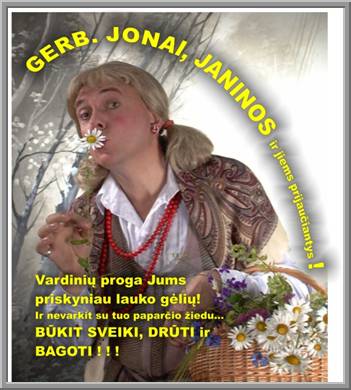
How to Celebrate a Lithuanian Midsummer
Midsummer Day in Lithuania is a celebration of the Summer Solstice as well as being a holy day sacred to St. John. The real festivities take place on the evening, prior to the date itself, which is 24th of June. That night, throughout Lithuania, people come together to celebrate Saint Jonas' Festival, also known as Jonines, Kupolines or Rasos.
|
Things you'll need: • Outdoor party place |
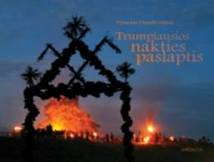 |
Step 1
Select an outdoor place in which to hold your party. Decorate your party space with fresh flowers and, if possible, raise a pole covered with flowers and herbs. Make garlands of fresh flowers and ribbons to be worn by all of the young girls and unmarried women present.
Step 2
Build a bonfire if at all possible. Lithuanian tradition calls for a tall pole crowned with a wooden wheel that has been soaked in tar or filled with birch bark, but you may have to make do with a small fire built in a fire pit or even candles. Whichever form of fire you use, if there is a member of your party named John, Jonas, or another similar name, that person should be the one to light it.
Step 3
Play Lithuanian music and encourage guests to sing Lithuanian songs if they know any. Lithuanian folk dances are also traditional, but if you do not know any of the old songs or dances you can still get a book of Lithuanian folk or fairy tales and reads some of them out loud to set the mood.
Step 4
Set out a feast consisting of traditional Lithuanian foods. Kugelis, the baked potato pudding that is the Lithuanian national dish, is pretty much de rigeur, and your guests may also enjoy such dishes as Skilandis (a smoked sausage-type meat), Salti barsciai (a cold soup made from beets), Cepelinai (potato dumplings with a ground meat filling), Vedarai (potato sausage) and Bulviniai Blynai (a type of potato pancake). Poppy seed cakes (Pyragas Su Aguonomis) and honey cakes (Meduoliai) make for an enjoyable, traditional dessert.
Step 5
Look for Lithuanian beers such as Utenos, Svyturys and Kalnapilis, Lithuanian Stumbras vodka, and Anyksciu Vynas wine. If you're the do-it-yourself type, you might like to try brewing up a batch of Lithuanian honey mead (Midus) or even Gira (also known as Kvass), which is made from fermenting this and that, usually bread, but sometimes other items such as barley, cranberries or caraway seeds. Caraway seeds can also be used to brew up a tea for non-drinkers, as can linden blossoms should you be able to acquire any.
Step 6
Take part in special Lithuanian Midsummer traditions like hunting for the magic fern blossom at midnight. This fern blossom, which should be gathered up in a silk handkerchief, is said to make the bearer wise, rich and happy, but is nearly impossible to find as it is guarded by monsters and witches. Another Midsummer game involves having unmarried girls and women float their flower garlands downstream (should you have access to a suitable body of water) to determine the length of time until they get married--the farther their garlands float, the sooner they will marry, supposedly. Yet another custom involves jumping over the bonfire and if the festivities go on all night long, revelers should be sure to wash their faces in the morning dew as they find their way home.
Read more: How to Celebrate a Lithuanian Midsummer | eHow.com http://www.ehow.com/how_4443202_celebrate-lithuanian-midsummer.html#ixzz0rZrzzi9x
Lithuanian Midsummer

The holiday, in fact, is not the Midsummer Day, June 24, but the evening and night preceding it. The holiday coincides with the summer solstice. At the beginning of the 20th century it was observed all over Lithuania, now it is more popular in the northern and central parts of the country. Although St. John the Baptist occupies a very important place in the hierarchy of saints, the Church does not attach any great importance to the celebration of his nativity, which falls on the Midsummer Day. It is a festival of simple people, connected with the veneration of fire. Young girls adorn their heads with flower wreaths. A tall pole with a wooden wheel soaked in tar or filled with birch bark is hoisted at the top of the highest hill in the vicinity. Men whose names are Jonas (John) set the wheels on fire and make bonfires around it. In some places a second pole is hoisted with flowers and herbs. Young people dance round the fire, sing songs about rye, play games, men try to jump over the fire. The burning wheels on the poles are rolled down the hill into a river or a lake at its foot, men jumping over it all along. On the Midsummer Day people weed the rye and burn all the weeds.
On Midsummer Day's morning witches acquire special powers, they drag towels over the dewy grass to affect cows' milk. To save their cows from the witches' magic farmers shut them in cowsheds for the Midsummer Night and stick bunches of nettle in the door to scare the witches away. On Midsummer Day cows are driven out to pasture in the early after- noon when there is no more dew on the grass. Horses, however, are left to graze in the open throughout the night, or the witches magic has no effect on them.
On Midsummer Day dew has special healing powers. Young girls wash their faces in it to make themselves beautiful, older people do the same to make themselves younger. It is good to walk barefoot in dew on Midsummer Day's morning, for it saves the skin from getting chapped.
Midsummer Day and the time immediately preceding it is believed to have special powers. Medicinal herbs collected from June 1 to the Midsummer Day can cure 12 (some say 99) diseases. There are girls who save their Midsummer Day's wreaths all the year round. Great importance is attached to the Midsummer Day's fire. Its embers are brought home to make the hearth fire, and its ashes are spread in the fields.
There are numerous stories about the fern, which comes into blossom in the thick of the woods on Midsummer Night. He who finds a fern blossom becomes a wise, rich and happy man. But it is not easy to find a fern blossom, for horrible monsters and witches try to scare everybody away so that they could snatch the blossom themselves. Everybody who wants to find a fern blossom must know that only nine-year-old ferns can burst into blossom, that it is necessary to spread a silk kerchief under the clump for the blossom to fall onto, to draw a circle around oneself with a rowan stick hallowed in church, light a candle and pray in defiance of the monsters around. The blossom that drops onto the kerchief looks like a speck of gold. It is best to saw it under the skin of a finger or the palm, then nobody will steel it from you.
Only a very good man can hope to find a fern blossom and it can happen only once in his lifetime, Sometimes the fern blossom drops into a poor man's bast shoe unawares and suddenly the man acquires knowledge of the hidden treasures, of the speech of animals and birds, trees and bees. But when the man comes home and takes off his shoes, the fern blossom falls out, all the man's knowledge disappears.
Young people play games all through Midsummer Night until sunrise or until dew falls out, Girls float wreaths on rivers to find out their prospects for marriage. The farther their wreaths float the sooner they will get married. It is also very important which bank the wreath will stop at. Sometimes a burning candle or a bowl filled with burning tar is fixed in the middle of the wreath. A great number of Midsummer Night's superstitions and customs are similar to those observed on Christmas Eve. A girl will marry the man whom she will see in her dream walking along the straw placed across the bowl of water under her bed or who will dry his face on the towel placed beside her bed. The future husband will come from the direction in which she notices the first bonfire on Midsummer Night.
On the eve of Midsummer Night people adorn the wayside shrines which contain figurines of St. John. They also honour all Johns they know. This they do in various ways, for example, by fixing a wreath of oak leaves around his door. This is usually done in secret and the man thus honoured must guess whose job it was (or catch him doing it) and give him a treat.
The research done by the author of the present book in the past five years has convinced him that the customs of Christmas Eve and Midsummer Night, which coincide with the winter and summer soltices, are very closely connected. Sometimes the Christmas Eve table is covered exclusively with the hay mown just before Midsummer Night. Superstitions and customs of the two feasts are very similar. Christmas Eve customs are dominated by darkness, veneration of death and the dead, expectation, feeding of birds in a cart wheel, running round the house with a bowl of pudding, walking round the orchard. Those are all symbols of time. The summer soltice - Midsummer Night - is dominated by symbols of the sun, such as burning cart wheels hoisted high on poles which are adorned with wreaths of herbs and flowers, symbols of growth. In honour of the sun the fire from the bonfires is brought home to light the hearth, the fields are sprinkled with ash. Later these customs blended with those of Easter. The lighting of bonfires is the privilege of men who are called John. Sometimes it is the privilege of the oldest of all Johns in the vicinity. Those and other details in the celebration Of Midsummer Night testify that in the pre-Christian period Midsummer Night was celebrated as a feast of the sun.
- Bookmark :
- Digg
- del.icio.us
- Stumbleupon
- Redit it
Fresh winds of new confidence based on young people and new leaders badly needed: a Catch 22 situation*
- Posted by - (0) Comment

By Val Samonis
RE: Lithuania has been having a difficult time setting an investment climate.
Mrs. Narusiene is right. Who wants to invest in a smallish (and getting smaller) country largely run by the former communist nomenklatura in the last close to two decades since Independence. Despite its glorious history, LT still has a bad image problem globally, largely due to the 1992 return of former Bolsheviks to power. Younger generations see that older folks have been voting for communists, so now we have a historically highest emigration - young people "vote with their feet"! Who would want to invest in a country that does not believe in itself; who does not correct its mistakes swiftly?
Fresh winds of new confidence based on young people and new leaders are badly needed: a catch 22 situation.
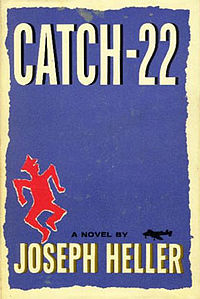
* Catch 22:
http://en.wikipedia.org/wiki/Catch-22
- Bookmark :
- Digg
- del.icio.us
- Stumbleupon
- Redit it
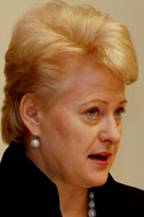 Dalia Grybauskaite, President of the Republic of Lithuania |
 Regina Narusiene, President of the World Lithuanian Community |
REGINA NARUSIENE: “The majority, I believe, are disappointed and discouraged with the present president’s seemingly unfriendly view toward Lithuanian-Americans and others abroad.”
The Baltic Times writes that Lithuanian President Grybauskaite is supposedly “disappointed by Lithuanian emigres’ inability to attract U.S.-based investments to Lithuania.” The newspaper refers to a WikiLeaks document.
According to WikiLeaks, Grybauskaite emphasizes that most prominent U.S. Lithuanian emigres, instead of focusing on developing U.S.- Lithuanian business ties, prefer providing political advice to the Lithuanian authorities, which may not be that necessary nowadays.
In a response to The Baltic Times, Regina Narusiene, President of the World Lithuanian Community, says that “The majority of Lithuanian-Americans are disappointed with Grybauskaite.”
“How do Lithuanian-Americans’ views generally differ on the former U.S.-much-linked President Valdas Adamkus and his successor, Dalia Grybauskaite? Which is favored?,” the newspaper asks Narusiene.
And she answers: “There are different points of view. Some favor President Adamkus, but the majority, I believe, are disappointed and discouraged with the present president’s seemingly unfriendly view toward Lithuanian Americans and others abroad.”
“There is the tendency of some Lithuanian politicians to think that “Lithuania belongs to the Lithuanians.” By that they mean those living in Lithuania only. The people of Lithuania have a more favorable view of Lithuanians living abroad.”
“The Lithuanians abroad have brought many investments to Lithuania. However, I want to emphasize, Lithuania has been having a difficult time setting an investment climate competitive with other countries.”
“Collaboration can have different meanings. Our private ties with the country after independence never diminished, but, in fact, intensified. Economic ties are different. A great deal of money is sent to Lithuania by Lithuanians abroad, especially to their family and friends. I believe an amount equal to about 20 percent of Lithuania’s annual national budget. Some firms have located in Lithuania, but Lithuania has to maintain an inviting environment for investment, which they are developing. Cultural collaboration, however, I admit, has been weak. There is a Lithuanian opera in Chicago that has been collaborating with the Lithuanian National Opera and Ballet Theater. We have participated in the Dance Festivals in Lithuania and sent works of art to Lithuania. Some of the entertainers from Lithuania have come to us to entertain, but working out joint programs has been difficult.”
“Can you think of any cases when Lithuanian emigres cut off their ties with the Motherland because of the lack of the political will to adopt a dual-citizenship law?,” Baltic Times asks.
“There are a number of new emigres who have simply said, “I can do better and live more securely abroad. If they do not want us, then why bother.” Unfortunately, these are well educated young people that Lithuania cannot afford to lose. In several instances, the taking away of Lithuanian citizenship has forced some to keep foreign citizenship so as not to lose their means of support, their pension.”
Ref: http://www.baltictimes.com/news/articles/28875/
* * *
Around half of all Lithuanians in the world live outside their home country. They represent a human resource Lithuania desperately needs to get the country back on its feet again after 50 years of bloody wars, genocides, deportations, Soviet opression and now two decades with much muddle and confusion instead of professional focus on collaboration and team work among its own populations here and abroad.
I suggest that the president now reaches out and invites all Lithuanians, and friends of this country around the world, to a close and constructive cooperation. A continued conflict is truly meaningless and devastating.
Aage Myhre, Editor-in-Chief
Lithuania would benefit significantly by availing itself of the expertise and knowledge found in the Diaspora communities
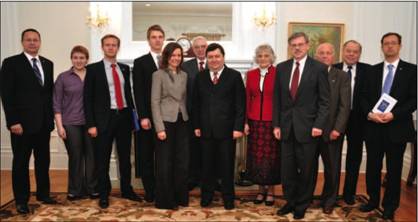
Lithuanian American Council (LAC) Delegation in Conference at Lithuania’s Embassy (LE) in Washington, D.C. with Ambassador Žygimantas Pavilionis, and Emanuelis Zingeris from the Lithuanian Parliament
A delegation representing the Lithuanian American Council (LAC) was recently received at the Lithuanian Embassy in Washington D.C., where it met with the Chairman of the Foreign Affairs Committee of the Lithuania’s Parliament, Emanuelis Zingeris and Lithuania’s Ambassador to the United States, Zygimantas Pavilionis.
In the course of the meeting LAC representatives expressed their concern on a wide range of topics including Lithuania’s developing energy policy, the country’s image in the international community, emigration issues and their demographic impact, the prospect of maintaining citizenship rights of recent immigrants, ongoing cooperation between organizations of the Diaspora and Lithuania, and minority issues in Lithuania. LAC representatives suggested that Lithuania would benefit significantly by availing itself of the expertise and knowledge found in the Diaspora communities in developing energy and security policies and a host of other areas such as environmental issues, ecology, medicine, economic development, and the promotion of improved interactions between the government and the people through non-governmental organizations.
- Bookmark :
- Digg
- del.icio.us
- Stumbleupon
- Redit it
- Posted by - (0) Comment
The World Lithuanian Economic Forum, 4 – 5 July:
A perfect meeting platform for Lithuanians from all over the world

Mindaugas Glodas, General Manager of Microsoft Lithuania:
“The World Lithuanian Economic Forum is a perfect meeting platform for Lithuanian business people from all over the world and for those who are interested in Lithuania as a potential partner. I believe that making personal contacts is the best means to foster international cooperation and successful growth of new businesses. Lithuanian business needs new markets and investment for development of new ideas. This is one more step that has to be taken towards seeking to make Lithuania more important for the world and to making the world more important to Lithuania.”
PROGRAMME: http://www.plef.lt/programa.htm
- Bookmark :
- Digg
- del.icio.us
- Stumbleupon
- Redit it
- Posted by - (0) Comment
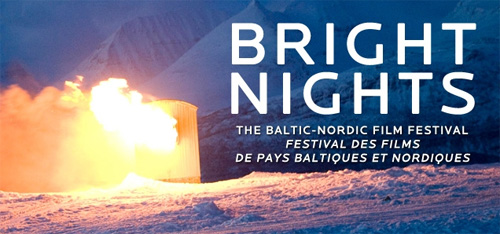
The Canadian cities Montreal and Ottawa are organising the annual Baltic-Nordic film festival Bright Nights during May-June 2011. In collaboration with Baltic and Nordic nations, the Canadian Film institute premiered festival of films from Northern European countries, among them Finland, Sweden, Norway, Iceland, Estonia, Latvia, Denmark and Lithuania.
Lithuania is represented by the movie director Rasa Miskinyte’s The Bug Trainer. The movie depicts a story of one of the giants of animation, Lithuania born Russian-French animator Ladislas Starewitch. A real historical figure, Starewitch (1882-1965) was a pioneer of puppet animation and is arguably one of the world’s forgotten film geniuses, who used insects and other animals as protagonists in his stop-motion pictures. In The Bug Trainer dir. Rasa Miskinyte tries to “decode” Starewitch by exploring his creative process, his eccentric biography and, above all, his remarkable animated films.
Rasa Miskinyte is a well known movie producer in Lithuania; in 2009 she received a Silver Crane - Lithuanian film industry award for best professional job for The Bug Trainer also.
This summer, viewers in Canada also got a chance to approach to a remarkable story of animator Ladislas Starewitch during the Bright Lights film festival.
- Bookmark :
- Digg
- del.icio.us
- Stumbleupon
- Redit it
VilNews e-magazine is published in Vilnius, Lithuania. Editor-in-Chief: Mr. Aage Myhre. Inquires to the editors: editor@VilNews.com.
Code of Ethics: See Section 2 – about VilNews. VilNews is not responsible for content on external links/web pages.
HOW TO ADVERTISE IN VILNEWS.
All content is copyrighted © 2011. UAB ‘VilNews’.

 Click on the buttons to open and read each of VilNews' 18 sub-sections
Click on the buttons to open and read each of VilNews' 18 sub-sections 

















.jpg)



